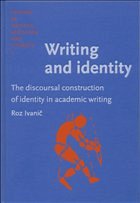Main description:
Writing is not just about conveying 6;content' but also about the representation of self. (One of the reasons people find writing difficult is that they do not feel comfortable with the 6;me' they are portraying in their writing. Academic writing in particular often poses a conflict of identity for students in higher education, because the 6;self' which is inscribed in academic discourse feels alien to them.)
The main claim of this book is that writing is an act of identity in which people align themselves with socio-culturally shaped subject positions, and thereby play their part in reproducing or challenging dominant practices and discourses, and the values, beliefs and interests which they embody. The first part of the book reviews recent understandings of social identity, of the discoursal construction of identity, of literacy and identity, and of issues of identity in research on academic writing. The main part of the book is based on a collaborative research project about writing and identity with mature-age students, providing:
- a case study of one writer's dilemmas over the presentation of self;
- a discussion of the way in which writers' life histories shape their presentation of self in writing;
- an interview-based study of issues of ownership, and of accommodation and resistance to conventions for the presentation of self;
- linguistic analysis of the ways in which multiple, often contradictory, interests, values, beliefs and practices are inscribed in discourse conventions, which set up a range of possibilities for self-hood for writers.
The book ends with implications of the study for research on writing and identity, and for the learning and teaching of academic writing.
The book will be of interest to students and researchers in the fields of social identity, literacy, discourse analysis, rhetoric and composition studies, and to all those concerned to understand what is involved in academic writing in order to provide wider access to higher education.
Table of contents:
- List of Figures
- Acknowledgments
- Chapter 1: Introduction
- Part One: Theoretical Approaches to writing and Identity
- Chapter 2: Discourse and Identity
- Chapter 3: Literacy and Identity
- Chapter 4: Issues of identity in academic writing
- Part Two: The Discoursal Construction of Identity in Academic Writing: An investigation with eight maturestudents
- Chapter 5: Introduction to Part Two
- Chapter 6: Rachel Dean: a case study of writing and identity
- Chapter 7: The origins of discoursal identity in writers'experience
- Chapter 8: The sense of self and the role of the reader in the discoursal construction of writer identity
- Chapter 9: The discoursal construction of academic community membership
- Chapter 10: Multiple possibilities for self-hood in the academic discourse community
- Conclusion
- Chapter 11: Writer identity on the agenda in theory and in practice
- References
- Index
Writing is not just about conveying 6;content' but also about the representation of self. (One of the reasons people find writing difficult is that they do not feel comfortable with the 6;me' they are portraying in their writing. Academic writing in particular often poses a conflict of identity for students in higher education, because the 6;self' which is inscribed in academic discourse feels alien to them.)
The main claim of this book is that writing is an act of identity in which people align themselves with socio-culturally shaped subject positions, and thereby play their part in reproducing or challenging dominant practices and discourses, and the values, beliefs and interests which they embody. The first part of the book reviews recent understandings of social identity, of the discoursal construction of identity, of literacy and identity, and of issues of identity in research on academic writing. The main part of the book is based on a collaborative research project about writing and identity with mature-age students, providing:
- a case study of one writer's dilemmas over the presentation of self;
- a discussion of the way in which writers' life histories shape their presentation of self in writing;
- an interview-based study of issues of ownership, and of accommodation and resistance to conventions for the presentation of self;
- linguistic analysis of the ways in which multiple, often contradictory, interests, values, beliefs and practices are inscribed in discourse conventions, which set up a range of possibilities for self-hood for writers.
The book ends with implications of the study for research on writing and identity, and for the learning and teaching of academic writing.
The book will be of interest to students and researchers in the fields of social identity, literacy, discourse analysis, rhetoric and composition studies, and to all those concerned to understand what is involved in academic writing in order to provide wider access to higher education.
Table of contents:
- List of Figures
- Acknowledgments
- Chapter 1: Introduction
- Part One: Theoretical Approaches to writing and Identity
- Chapter 2: Discourse and Identity
- Chapter 3: Literacy and Identity
- Chapter 4: Issues of identity in academic writing
- Part Two: The Discoursal Construction of Identity in Academic Writing: An investigation with eight maturestudents
- Chapter 5: Introduction to Part Two
- Chapter 6: Rachel Dean: a case study of writing and identity
- Chapter 7: The origins of discoursal identity in writers'experience
- Chapter 8: The sense of self and the role of the reader in the discoursal construction of writer identity
- Chapter 9: The discoursal construction of academic community membership
- Chapter 10: Multiple possibilities for self-hood in the academic discourse community
- Conclusion
- Chapter 11: Writer identity on the agenda in theory and in practice
- References
- Index

